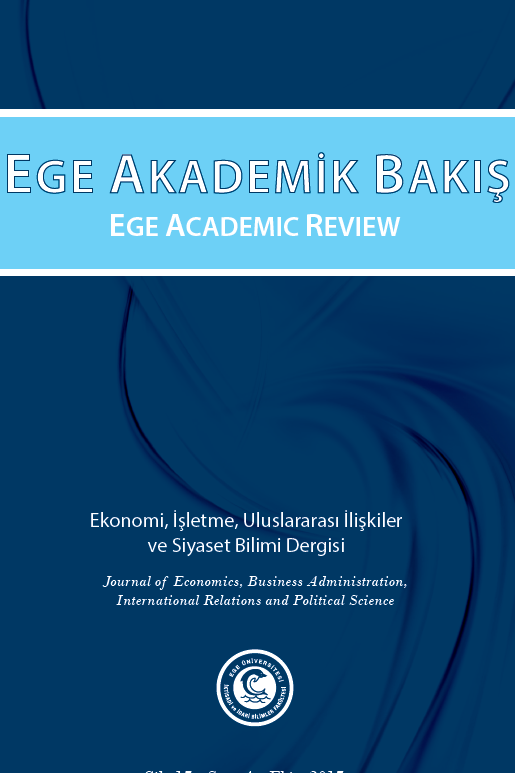An Empirical Assessment of UK Economic Performance in the Context of Brexit: An EU Wide Comparison
This paper investigates overall well-being of the UK economy in comparison with other EU member countries-prior to 2015 referendum. The results will help to comprehend the very nature of the exit decision in this light. This work to a certain extent expected to help establish whether the decision taken at the referendum was more reflection of a political nature that accommodated partisan bias- or- rather it was based on the public concerns stemming from economic considerations. This empirical research employs PROMETHEE method which is one of the best known multi criteria methods. The alternatives in the comparison matrix are comprised of 28 EU member countries and the criteria are comprised of nine criteria. The overall performance is the combination of fundamental indicators most of which-one way or another-were related to the political debate on the eve of referendum.
Keywords:
PROMETHEE method, European economic integration, Brexit referendum, UK economy Financial crisis, Single market,
___
- Bank of England (2015), “EU Membership and Bank of England” Bank of England Weekly Report 21 October, https://www.bankofengland.co.uk/-/media/ boe/files/speech/2015/eu-membership-and-thebank-of-england-pdf (15.5.2017) Brans, J.P. and Vincke, P. (1985) “A Preference Ranking Organization Method” Management Science, 31(6): 647-656.
- City of London (2013) ‘Switzerland’s Approach to EU Engagement: A Financial Services Perspective’, Centre for Swiss Politics, University of Kent, Special Interest Paper, 1-14. https://www.cityoflondon.gov. uk/business/economic-research-and-information/ research-publications/Documents/research-2013/ Switzerlands-approach-to-EU-engagement.pdf (14.6.2017)
- Dağdeviren, M. and Eraslan, E. (2008) “PROMETHEE SıralamaYöntemi ile Tedarikçi Seçimi” Gazi Üniversitesi Mühendislik-Mimarlık Fakültesi Dergisi, 23(1): 69-75.
- Emmerson, C., Johnson, P. Mitchell, I. and Phillips, D. (2016) “Brexit and the UK’s Public Finances”, Institute for Fiscal Studies, IFS Report 116, 1-80. https://www. ifs.org.uk/uploads/publications/comms/r116.pdf (5.5.2017)
- HM Treasury (2016) “HM Treasury Analysis: The LongTerm Economic Impact of EU Membership and the Alternatives” https://www.gov.uk/government/ publications/hm-treasury-analysis-the-long-termeconomic-impact-of-eu-membership-and-the-alternatives (2.3.2017)
- House of Commons (2013) ‘Leaving the EU’, Research Paper 13/42, 1-112. https://beta.parliament.uk/ search?q=leaving+the+EU (12.5.2017)
- PwC (2016) “Leaving the EU: Implications for the UK Economy” Price Water House Coopers (PwC) Report, https://www.pwc.co.uk/economic-services/assets/ leaving-the-eu-implications-for-the-uk-economy. pdf (2.3.2017)
- Saunders, M., Fordham, T., Subbs, J., Lorenzen,H., Roy, R., Schulz, C., Searle, J., Goves, P., Amin, A. and Fahyn J. (2016) “Brexit Risk: Implications for Economies and Markets” Citi Europe Research-Economics https:// www.citivelocity.com (23.6.2017).
- Özdağoğlu, A. (2013) “Üretim İşletmelerinde Lazer Kesme Makinelerinin PROMETHEE Yöntemi ileKarşılaştırılması” UluslararasıYönetim İktisat ve İşletme Dergisi, 9(19): 305-318.
- ISSN: 1303-099X
- Yayın Aralığı: Yılda 4 Sayı
- Başlangıç: 2000
- Yayıncı: Ege Üniversitesi
Sayıdaki Diğer Makaleler
Filiz AKBAŞ YEŞİLYURT, Ensar YEŞİLYURT
Gözde KOCA, Kaliyan MATHİYAZHAGAN
